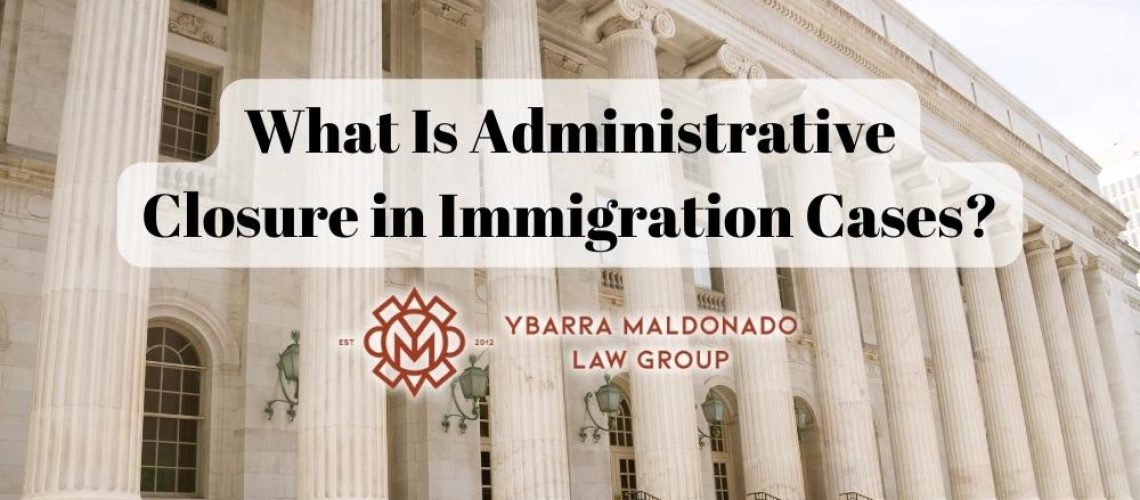Navigating the complexities of immigration law can be daunting, especially when facing deportation proceedings. In such cases, individuals seek every available avenue to protect their rights and remain in the country. One such mechanism offering a glimmer of hope within the intricate web of immigration law is administrative closure. Immigration cases tend to be very complex, so working with an experienced attorney is a must.
At Ybarra Maldonado Law Group, we are incredibly passionate about representing immigrants and their families in the Phoenix area. If you are facing deportation, a deportation defense lawyer with our firm is here to help. To schedule a free consultation about your case, please call our office at 602-910-4040 today.
What Is Administrative Closure?
Administrative closure is a legal procedure where an immigration judge decides to pause or temporarily suspend deportation proceedings against an individual in federal courts. This action does not grant legal status or permanent residency, but rather it puts the deportation process on hold.
Under the Trump administration, one policy prohibited the use of administrative closure. However, after the Biden administration’s review of the immigration backlog, this Trump-era policy was reversed. Attorney General Merrick Garland reversed this policy. He has described administrative closure as a way for immigration judges and courts to manage their dockets.
With this policy reversal, AG Garland reestablished immigration judges’ ability to hand down dismissal orders before an immigration court hearing. Additionally, if both sides agree to administrative closure before the dismissal is handed down, the immigration judge can close the case before the parties ever go to court. This frees up the court’s active docket and lessens the backlog for federal immigration courts.
Notably, the concept of administrative closure does not appear in the Immigration and Nationality Act. However, immigration courts and the Board of Immigration Appeals, an agency within the Department of Justice, all recognize it as a helpful procedural tool.
Within the Department of Justice, the Executive Office for Immigration Review (EOIR) oversees and manages the immigration courts. It also manages immigration proceedings that arise when the Department of Homeland Security believes a person to be in violation of their visa or in the country unlawfully.
Motion to Terminate vs. Administrative Closure
It’s crucial to understand the distinction between a motion to terminate and administrative closure. A motion to terminate aims to completely end deportation proceedings, while administrative closure merely pauses or suspends these proceedings. The decision to reopen the case remains at the judge’s discretion in administrative closure.
How Does an Administrative Closure Work?

In an immigration case, either the individual facing removal proceedings or the government’s attorney can request administrative closure. If the judge grants this request, the case is temporarily put on hold, allowing the individual to remain in the country without immediate deportation risk.
During this period, the individual may not obtain permanent legal status, but they can often apply for work authorization, allowing them to lawfully work in the country until the case is reopened. Basically, it gives an immigrant more time in the process of applying to stay in the United States.
In some cases, administrative closure allows immigrants to apply for and receive a green card or family visa. The Board of Immigration Appeals can review requests for administrative closure based on certain criteria. If administrative closure is granted, this can indefinitely suspend removal proceedings.
When Does Administrative Closure Help an Immigration Case?
Administrative closure can be beneficial in various scenarios. It allows individuals to seek alternative legal options, such as pursuing different avenues for residency, including family-based petitions, employer-sponsored visas, and asylum seekers. Additionally, administrative closure can provide time for changes in immigration policies or eligibility criteria that might favor the individual’s case.
Other examples of those who could benefit from administrative closure include immigrants seeking Special Immigrant Juvenile Status or Temporary Protected Status.
Work Authorizations and Administrative Closure
One significant advantage of administrative closure is the possibility of obtaining a work permit. While the case is on hold, eligible individuals can apply for and receive work authorization, allowing them to support themselves and their families during this uncertain period.
How to Apply for Administrative Closure

Applying for administrative closure typically involves submitting a formal request to the Office of the Chief Counsel. This request must include compelling reasons and legal arguments supporting the suspension of deportation proceedings. An experienced immigration attorney from Ybarra Maldonado Law Group can guide you through this intricate process, ensuring that all necessary documentation and legal arguments are presented effectively. If successful, this will temporarily pause removal proceedings against you.
Can Administrative Closure Change Your Immigration Status?
It’s crucial to note that administrative closure does not change an individual’s immigration status. It merely delays the deportation proceedings and updates immigration court records accordingly. However, during this time, individuals can explore other legal options that might lead to a change in status or provide a path to lawful residency in the future.
Those hoping to change their immigration status must still go through the standard procedures set forth by the United States Citizenship and Immigration Services. We strongly recommend working with a Phoenix immigration lawyer for your immigration case. Immigration proceedings can be extremely complicated and challenging, but an attorney will guide you through the process with ease.
Contact Ybarra Maldonado Law Group If You Face Deportation Proceedings

Facing deportation proceedings is a distressing experience that requires adept legal guidance. The skilled Phoenix immigration attorneys at Ybarra Maldonado Law Group possess the experience and dedication needed to navigate the complexities of administrative closure and other aspects of immigration law, such as prosecutorial discretion.
Our team understands the nuances of administrative closure and can craft a strong case on your behalf, presenting compelling arguments to secure the best possible outcome for your situation.
If you or someone you know is facing deportation or seeking assistance with an immigration case, don’t hesitate to contact us. Our compassionate and knowledgeable attorneys are ready to provide the legal support and representation you need during this challenging time.
Remember, administrative closure can offer a crucial lifeline in your immigration journey, and having the right legal team by your side can make all the difference.
For a consultation with our experienced attorneys, contact Ybarra Maldonado Law Group today. To schedule your free consultation with us, please call our office at 602-910-4040 or submit an online intake form.


